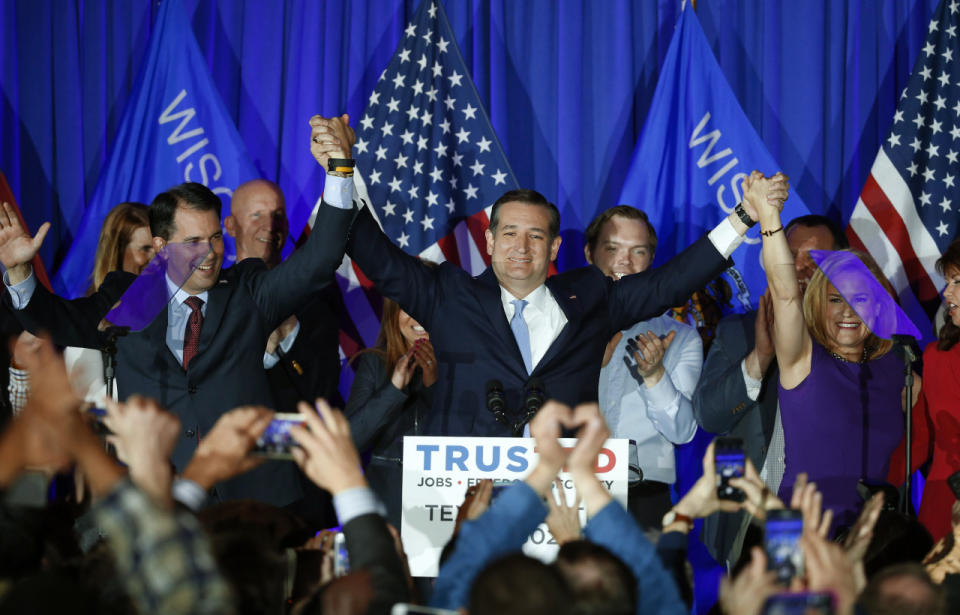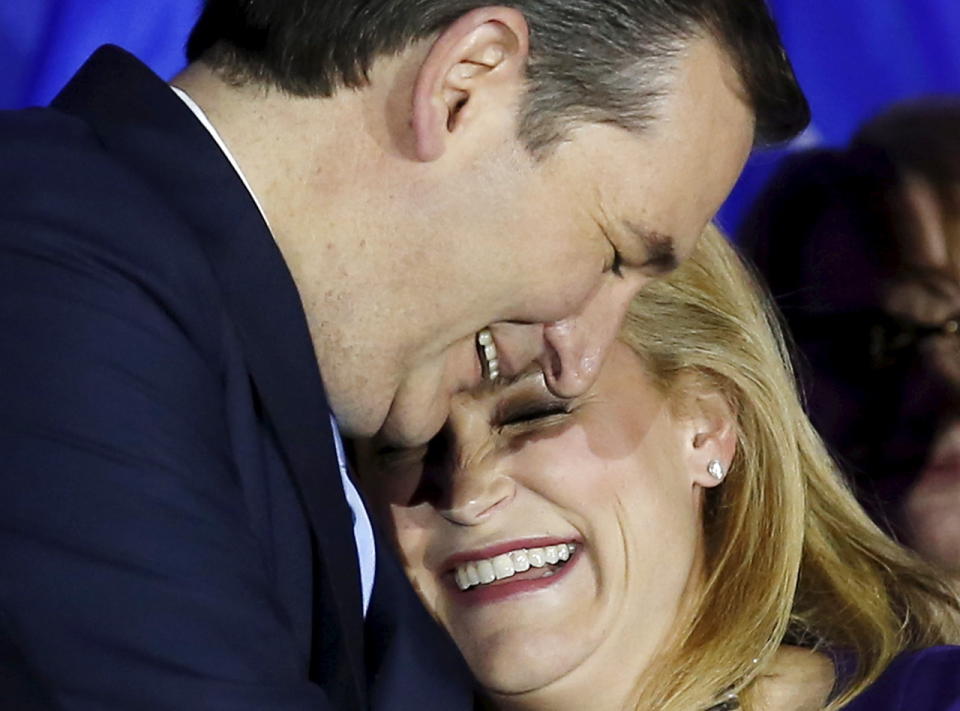Trump falters in Wisconsin, as Cruz wins big
NEW YORK — Texas Sen. Ted Cruz soundly defeated Donald Trump in Wisconsin’s Republican presidential primary Tuesday, winning close to 50 percent of the vote in a three-man contest and potentially giving a burst of new energy to efforts to stop the real estate mogul from clinching the GOP nomination. The outcome appeared to increase the odds of a contested convention this summer.
“Tonight is a turning point. It is a rallying cry,” Cruz declared at his primary night party in Milwaukee. “We have a choice, a real choice.”
But it was too soon to tell whether Cruz’s victory was a sign that the #NeverTrump movement is truly gaining steam, or if it was merely a bump in the road for Trump, who has spent the last several days trying to regain the offensive after a series of self-inflicted wounds to his campaign.
While exit polls showed that Trump had won among moderates, and preliminary results showed him doing well in rural parts of the state — where he had been expected to do best — there were some troubling signs for his campaign. Among them were Cruz’s decisive wins among women and suburban voters, two constituencies Trump has struggled to win so far.

Sen. Ted Cruz and his wife, Heidi, with Gov. Scott Walker of Wisconsin, left, celebrate his victory at a campaign event Tuesday in Milwaukee. (Photo: Paul Sancya/AP)
Slideshow: Primary day in Wisconsin >>>
Those two voting blocs could be pivotal as the race shifts toward Northeastern states such as New York. This is considered favorable terrain for Trump, but Cruz and Ohio Gov. John Kasich, who came in a distant third in Wisconsin, are looking to peel off as many delegates as possible to stop him from winning the nomination outright.
Assisted by an endorsement from Gov. Scott Walker, Cruz easily won a key GOP stronghold in Wisconsin: the suburbs of Milwaukee, home to college-educated, middle-class Republicans. The loss underscores the difficulty Trump has had winning over suburban Republicans in the contest so far, including in Virginia, North Carolina and Georgia, states he easily won overall but where he lost in the suburbs of major cities.
That’s a worrying trend for Trump in New York, Connecticut, Rhode Island and Maryland, where the Republican electorate is largely suburban and where Trump needs to win to avoid a floor fight at the convention.
While initial results suggested Cruz would win most of Wisconsin’s 42 delegates, Trump still leads the Texas senator by at least 200 delegates. But another hint of trouble came in the exit polls, which found that 58 percent of those who had voted reported that they were “concerned” or “scared” about the prospect of Trump winning the presidency.
Trump has tried to position himself as the eventual GOP nominee, bragging that he can be a unifying force in the party even as he has struggled with discipline in what has been one of the toughest weeks of his candidacy so far, after several political missteps that unquestionably hurt his campaign in Wisconsin.
Among them were his fumbling answers on abortion — including a call for “punishment” for women who undergo an abortion if it were to be made illegal, which he later walked back — and his retweet of a supporter’s unflattering post of a photo of Cruz’s wife, Heidi. Trump also faced criticism for his defense of his campaign manager, Corey Lewandowski, who has been charged with simple battery for allegedly grabbing a female reporter during a campaign event last month.

Sen. Ted Cruz embraces his wife, Heidi, at his Wisconsin primary night rally Tuesday in Milwaukee. (Photo: Jim Young/Reuters)
Cruz quickly sought to take advantage of Trump’s flubs, holding several events in recent days to directly appeal to female voters, who, polls suggest, have been alienated by Trump’s behavior and rhetoric. On Monday, Cruz held a campaign event with Fox News’ Megyn Kelly, with whom Trump has had repeated run-ins during the campaign. Cruz suggested his rival has a problem with “strong women” — a phrase he repeated in his victory speech Tuesday night.
It’s a phrase Cruz is likely to use again as the race shifts toward mid-Atlantic and Northeastern states like New York and Pennsylvania, where women make up a major part of the Republican electorate. If Trump can’t win those states outright, his path to win the 1,237 delegates he needs to secure the nomination grows ever more difficult.
Trump, who is scheduled to kick off his New York campaign with a rally in Long Island on Wednesday, is still trying to unite the party behind his bid and cast himself as a more serious candidate. In recent days, he’s held smaller rallies, trying to project a calmer presence, and he has resisted engaging with protesters. On Tuesday, his campaign told the Washington Post he would deliver a series of policy speeches in coming weeks as he looks toward the general election.
Still, Trump couldn’t resist lashing out on Wednesday, portraying his share of the vote (about one-third, based on incomplete returns), as a victory against his critics. The statement, attributed to his campaign and not to the candidate personally, railed against “Lyin’ Ted Cruz” and accused the senator of illegally coordinating with super-PACs, “who totally control him.”
“Donald J. Trump withstood the onslaught of the establishment yet again,” the statement said. “Ted Cruz is worse than a puppet — he is a Trojan horse, being used by the party bosses attempting to steal the nomination from Mr. Trump.”

A Trump poster is left on the seats after a campaign event in Milwaukee. (Photo: Jim Young/Reuters)



